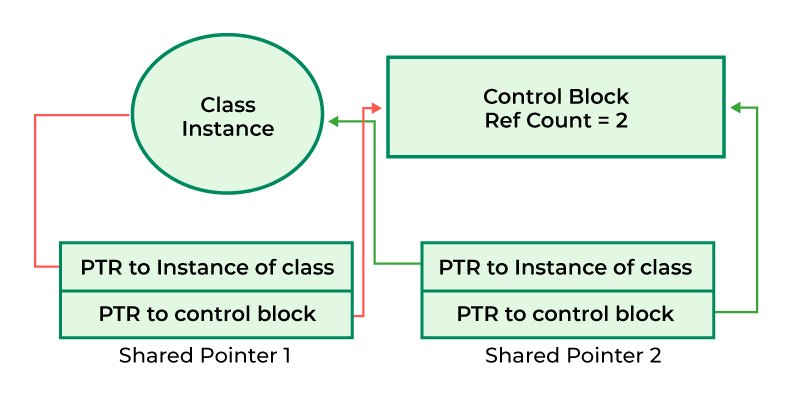shared_ptr in C++
Last Updated :
20 Oct, 2023
std::shared_ptr is one of the smart pointers introduced in C++11. Unlike a simple pointer, it has an associated control block that keeps track of the reference count for the managed object. This reference count is shared among all the copies of the shared_ptr instances pointing to the same object, ensuring proper memory management and deletion.
Prerequisites: Pointers in C++, Smart Pointers in C++.

Shared Pointer in C++
Syntax of std::shared_ptr
The shared_ptr of type T can be declared as:
std::shared_ptr <T> ptr_name;
Initialization of shared_ptr Objects
We can initialize the shared_ptr using the following methods:
1. Initialization using a New Pointer
shared_ptr<T> ptr (new T());
shared_ptr<T> ptr = make_shared<T> (new T());
2. Initialization using existing Pointer
shared_ptr<T> ptr(already_existing_pointer);
shared_ptr<T> ptr = make_shared(already_existing_pointer);
Member Methods of shared_ptr
Following are some members associated with shared_ptr:
| reset() |
Resets the std::shared_ptr to empty, releasing ownership of the managed object. |
| use_count() |
Returns the current reference count, indicating how many std::shared_ptr instances share ownership. |
| unique() |
Check if there is only one std::shared_ptr owning the object (reference count is 1). |
| get() |
Returns a raw pointer to the managed object. Be cautious when using this method. |
| swap(shr_ptr2) |
swaps the contents (ownership) of two std::shared_ptr instances. |
Examples of std::shared_ptr
Example 1:
C++
#include <iostream>
#include <memory>
using namespace std;
class A {
public:
void show() { cout << "A::show()" << endl; }
};
int main()
{
shared_ptr<A> p1(new A);
cout << p1.get() << endl;
p1->show();
shared_ptr<A> p2(p1);
p2->show();
cout << p1.get() << endl;
cout << p2.get() << endl;
cout << p1.use_count() << endl;
cout << p2.use_count() << endl;
p1.reset();
cout << p1.get() << endl;
cout << p2.use_count() << endl;
cout << p2.get() << endl;
return 0;
}
|
Output
0x1365c20
A::show()
A::show()
0x1365c20
0x1365c20
2
2
0
1
0x1365c20
Example 2:
C++
#include <iostream>
#include <memory>
using namespace std;
int main()
{
shared_ptr<int> shr_ptr1 = make_shared<int>(42);
shared_ptr<int> shr_ptr2 = make_shared<int>(24);
cout << "Value 1: " << *shr_ptr1 << endl;
cout << "Value 2: " << *shr_ptr2 << endl;
shared_ptr<int> shr_ptr3 = shr_ptr1;
if (shr_ptr1 == shr_ptr3) {
cout << "shared pointer 1 and shared pointer 3 "
"point to the same object."
<< endl;
}
shr_ptr2.swap(shr_ptr3);
cout << "Value 2 (after swap): " << *shr_ptr2 << endl;
cout << "Value 3 (after swap): " << *shr_ptr3 << endl;
if (shr_ptr1 && shr_ptr2) {
cout << "Both shared pointer 1 and shared pointer "
"2 are valid."
<< endl;
}
shr_ptr1.reset();
}
|
Output
Value 1: 42
Value 2: 24
shared pointer 1 and shared pointer 3 point to the same object.
Value 2 (after swap): 42
Value 3 (after swap): 24
Both shared pointer 1 and shared pointer 2 are valid.
Example 3: Implementing a Linked List Using std::shared_ptr
C++
#include <iostream>
#include <memory>
using namespace std;
struct Node {
int data;
shared_ptr<Node> next;
Node(int val)
: data(val)
, next(NULL)
{
}
};
class LinkedList {
public:
LinkedList()
: head(NULL)
{
}
void insert(int val)
{
shared_ptr<Node> newNode = make_shared<Node>(val);
if (!head) {
head = newNode;
}
else {
shared_ptr<Node> current = head;
while (current->next) {
current = current->next;
}
current->next = newNode;
}
}
void del(int val)
{
if (!head) {
return;
}
if (head->data == val) {
head = head->next;
return;
}
shared_ptr<Node> current = head;
while (current->next
&& current->next->data != val) {
current = current->next;
}
if (current->next && current->next->data == val) {
current->next = current->next->next;
}
}
void Print()
{
shared_ptr<Node> current = head;
while (current) {
cout << current->data << " -> ";
current = current->next;
}
cout << "NULL" << endl;
}
private:
shared_ptr<Node> head;
};
int main()
{
LinkedList linkedList;
linkedList.insert(1);
linkedList.insert(2);
linkedList.insert(3);
cout << "Linked List: ";
linkedList.Print();
linkedList.del(2);
cout << "Linked List after deleting 2: ";
linkedList.Print();
return 0;
}
|
Output
Linked List: 1 -> 2 -> 3 -> NULL
Linked List after deleting 2: 1 -> 3 -> NULL
Share your thoughts in the comments
Please Login to comment...